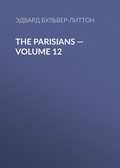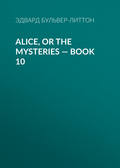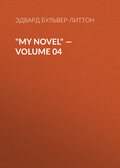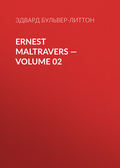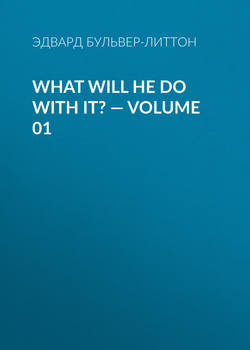
000
ОтложитьЧитал
CHAPTER XVII
By this chapter it appeareth that he who sets out on a career can scarcely expect to walk in perfect comfort, if he exchanges his own thick-soled shoes for dress-boots which were made for another man's measure, and that the said boots may not the less pinch for being brilliantly varnished.—It also showeth, for the instruction of Men and States, the connection between democratic opinion and wounded self-love; so that, if some Liberal statesman desire to rouse against an aristocracy the class just below it, he has only to persuade a fine lady to be exceedingly civil "to that sort of people."
Vance, returning late at night, found his friend still up in the little parlour, the windows open, pacing the floor with restless strides, stopping now and then to look at the moon upon the river.
"Such a day as I have had! and twelve shillings for the fly, 'pikes not included," said Vance, much out of humour—
"'I fly from plate, I fly from pomp, I fly from falsehood's specious grin;' I forget the third line. I know the last is—"
'To find my welcome at an inn.'
You are silent: I annoyed you by going—could not help it—pity me, and lock up your pride."
"No, my dear Vance, I was hurt for a moment, but that's long since over!"
"Still you seem to have something on your mind," said Vance, who had now finished reading his letters, lighted his cigar, and was leaning against the window as the boy continued to walk to and fro.
"That is true: I have. I should like your advice. Read that letter. Ought I to go? Would it look mercenary, grasping? You know what I mean."
Vance approached the candles and took the letter. He glanced first at the signature. "Darrell," he exclaimed. "Oh, it is so, then!" He read with great attention, put down the letter, and shook Lionel by the hand. "I congratulate you: all is settled as it should be. Go? of course: you would be an ill-mannered lout if you did not. Is it far from hence must you return to town first?"
LIONEL.—"No, I find I can get across the country,—two hours by the railway. There is a station at the town which bears the post-mark of the letter. I shall make for that, if you advise it."
"You knew I should advise it, or you would not have tortured your intellect by those researches into Bradshaw."
"Shrewdly said," answered Lionel, laughing; "but I wished for your sanction of my crude impressions."
"You never told me your cousin's name was Darrell: not that I should have been much wiser if you had; but, thunder and lightning, Lionel! do you know that your cousin Darrell is a famous man?"
LIONEL.—"Famous!—Nonsense. I suppose he was a good lawyer, for I have heard my mother say, with a sort of contempt, that he had made a great fortune at the bar."
VANCE.—"But he was in Parliament."
LIONEL.—"Was he? I did not know."
VANCE.—"And this is senatorial fame! You never heard your schoolfellows talk of Mr. Darrell?—they would not have known his name if you had boasted of it?"
LIONEL.—"Certainly not."
VANCE.—"Would your schoolfellows have known the names of Wilkie, of Landseer, of Turner, Maclise? I speak of painters."
LIONEL.—"I should think so, indeed."
VANCE (soliloquizing).—"And yet Her Serene Sublimity-ship, Lady Selina Vipont, says to me with divine compassion, 'Not in the way of your delightful art to know such men as Mr. Darrell!' Oh, as if I did not see through it, too, when she said, /a propos/ of my jean cap and velveteen jacket, 'What matters how you dress? Every one knows who you are!' Would she have said that to the earl of Dunder, or even to Sir Gregory Stollhead? No. I am the painter Frank Vance,—nothing more nor less; and if I stood on my head in a check shirt and a sky-coloured apron, Lady Selina Vipont would kindly murmur, 'Only Frank Vance the painter: what does it signify?' Aha!—and they think to put me to use, puppets and lay figures! it is I who put them to use! Hark ye, Lionel, you are nearer akin to these fine folks than I knew of. Promise me one thing: you may become of their set, by right of your famous Mr. Darrell; if ever you hear an artist, musician, scribbler, no matter what, ridiculed as a tuft- hunter,—seeking the great, and so forth,—before you join in the laugh, ask some great man's son, with a pedigree that dates from the Ark, 'Are you not a toad-eater too? Do you want political influence; do you stand contested elections; do you curry and fawn upon greasy Sam the butcher and grimy Tom the blacksmith for a vote? Why? useful to your career, necessary to your ambition? Aha! is it meaner to curry and fawn upon white-handed women and elegant coxcombs? Tut, tut! useful to a career, necessary to ambition!'" Vance paused, out of breath. The spoiled darling of the circles,—he, to talk such republican rubbish! Certainly he must have taken his two guineas' worth out of those light wines. Nothing so treacherous! they inflame the brain like fire, while melting on the palate like ice. All inhabitants of lightwine countries are quarrelsome and democratic.
LIONEL (astounded).—"No one, I am sure, could have meant to call you a tuft-hunter; of course, every one knows that a great painter—"
VANCE.—"Dates from Michael Angelo, if not from Zeuxis! Common individuals trace their pedigree from their own fathers! the children of Art from Art's founders!"
Oh, Vance, Vance, you are certainly drunk! If that comes from dining with fine people at the Star and Garter, you would be a happier man and as good a painter if your toddy were never sipped save in honeysuckle arbours.
"But," said Lionel, bewildered, and striving to turn his friend's thoughts, "what has all this to do with Mr. Darrell?"
VANCE.—"Mr. Darrell might have been one of the first men in the kingdom. Lady Selina Vipout says so, and she is related, I believe, to every member in the Cabinet. Mr. Darrell can push you in life, and make your fortune, without any great trouble on your own part. Bless your stars, and rejoice that you are not a painter!"
Lionel flung his arm round the artist's broad breast. "Vance, you are cruel!" It was his turn to console the painter, as the painter had three nights before /a propos/ of the same Mr. Darrell consoled him. Vance gradually sobered down, and the young men walked forth in the moonlight. And the eternal stars had the same kind looks for Vance as they had vouchsafed to Lionel.
"When do you start?" asked the painter, as they mounted the stairs to bed.
"To-morrow evening. I miss the early train, for I must call first and take leave of Sophy. I hope I may see her again in after life."
"And I hope, for your sake, that if so, she may not be in the same coloured print, with Lady Selina Vipont's eyeglass upon her!"
"What!" said Lionel, laughing; "is Lady Selina Vipont so formidably rude?"
"Rude! nobody is rude in that delightful set. Lady Selina Vipont is excruciatingly—civil."
CHAPTER XVIII
Being devoted exclusively to a reflection, not inapposite to the events in this history nor to those in any other which chronicles the life of men.
There is one warning lesson in life which few of us have not received, and no book that I can call to memory has noted down with an adequate emphasis. It is this: "Beware of parting!" The true sadness is not in the pain of the parting, it is in the When and the How you are to meet again with the face about to vanish from your view! From the passionate farewell to the woman who has your heart in her keeping, to the cordial good-by exchanged with pleasant companions at a watering-place, a country-house, or the close of a festive day's blithe and careless excursion,—a cord, stronger or weaker, is snapped asunder in every parting, and Time's busy fingers are not practised in re-splicing broken ties. Meet again you may; will it be in the same way?—with the same sympathies?—with the same sentiments? Will the souls, hurrying on in diverse paths, unite once more, as if the interval had been a dream? Rarely, rarely! Have you not, after even a year, even a month's absence, returned to the same place, found the same groups reassembled, and yet sighed to yourself, "But where is the charm that once breathed from the spot, and once smiled from the faces?" A poet has said, "Eternity itself cannot restore the loss struck from the minute." Are you happy in the spot on which you tarry with the persons whose voices are now melodious to your ear? beware of parting; or, if part you must, say not in insolent defiance to Time and Destiny, "What matters!—we shall soon meet again."
Alas, and alas! when we think of the lips which murmured, "Soon meet again," and remember how in heart, soul, and thought, we stood forever divided the one from the other, when, once more face to face, we each inly exclaimed, "Met again!"
The air that we breathe makes the medium through which sound is conveyed; be the instrument unchanged, be the force which is applied to it the same, still the air that thou seest not, the air to thy ear gives the music.
Ring a bell underneath an exhausted receiver, thou wilt scarce hear the sound; give the bell due vibration by free air in warm daylight, or sink it down to the heart of the ocean, where the air, all compressed, fills the vessel around it,' and the chime, heard afar, starts thy soul, checks thy footstep, unto deep calls the deep,—a voice from the ocean is borne to thy soul.
Where then the change, when thou sayest, "Lo, the same metal,—why so faint-heard the ringing?" Ask the air that thou seest not, or above thee in sky, or below thee in ocean. Art thou sure that the bell, so faint- heard, is not struck underneath an exhausted receiver?
CHAPTER XIX
The wandering inclinations of nomad tribes not to be accounted for on the principles of action peculiar to civilized men, who are accustomed to live in good houses and able to pay the income tax.— When the money that once belonged to a man civilized vanishes into the pockets of a nomad, neither lawful art nor occult science can, with certainty, discover what he will do with it.—Mr. Vance narrowly escapes well-merited punishment from the nails of the British Fair—Lionel Haughton, in the temerity of youth, braves the dangers of a British Railway.
The morning was dull and overcast, rain gathering in the air, when Vance and Lionel walked to Waife's lodging. As Lionel placed his hand on the knocker of the private door, the Cobbler, at his place by the window in the stall beside, glanced towards him, and shook his head.
"No use knocking, gentlemen. Will you kindly step in?—this way."
"Do you mean that your lodgers are out?" asked Vance.
"Gone!" said the Cobbler, thrusting his awl with great vehemence through the leather destined to the repair of a ploughman's boot.
"Gone—for good!" cried Lionel; "you cannot mean it. I call by appointment."
"Sorry, sir, for your trouble. Stop a bit; I have a letter here for you." The Cobbler dived into a drawer, and from a medley of nails and thongs drew forth a letter addressed to L. Haughton, Esq.
"Is this from Waife? How on earth did he know my surname? you never mentioned it, Vance?"
"Not that I remember. But you said you found him at the inn, and they knew it there. It is on the brass-plate of your knapsack. No matter,— what does he say?" and Vance looked over his friend's shoulder and read.
SIR,—I most respectfully thank you for your condescending kindness to me and my grandchild; and your friend, for his timely and generous aid. You will pardon me that the necessity which knows no law obliges me to leave this place some hours before the time of your proposed visit. My grandchild says you intended to ask her sometimes to write to you. Excuse me, sir—on reflection, you will perceive how different your ways of life are from those which she must tread with me. You see before you a man who—but I forget; you see him no more, and probably never will.
Your most humble and most obliged, obedient servant,W. W.
VANCE.—"Who never more may trouble you—trouble you! Where have they gone?"
COBBLER.—"Don't know; would you like to take a peep in the crystal— perhaps you've the gift, unbeknown?"
VANCE.—"Not I—bah! Come away, Lionel."
"Did not Sophy even leave any message for me?" asked the boy, sorrowfully.
"To be sure she did; I forgot-no, not exactly a message, but this—I was to be sure to give it to you." And out of his miscellaneous receptacle the Cobbler extracted a little book. Vance looked and laughed,—"The Butterflies' Ball and the Grasshoppers' Feast."
Lionel did not share the laugh. He plucked the book to himself, and read on the fly-leaf, in a child's irregular scrawl, blistered, too, with the unmistakable trace of fallen tears, these words:—
Do not Scorn it. I have nothing else I can think of which is All Mine. Miss Jane Burton gave it me for being Goode. Grandfather says you are too high for us, and that I shall not see you More; but I shall never forget how kind you were, never—never. Sophy.
Said the Cobbler, his awl upright in the hand which rested on his knee, "What a plague did the 'Stronomers discover Herschel for? You see, sir," addressing Vance, "things odd and strange all come along o' Herschel."
"What!—Sir John?"
"No, the star he poked out. He's a awful star for females! hates 'em like poison! I suspect he's been worriting hisself into her nativity, for I got out from her the year, month, and day she was born, hour unbeknown, but, calkeiating by noon, Herschel was dead agin her in the Third and Ninth House,—Voyages, Travels, Letters, News, Church Matters, and such like. But it will all come right after he's transited. Her Jupiter must be good. But I only hope," added the Cobbler, solemnly, "that they won't go a-discovering any more stars. The world did a deal better without the new one, and they do talk of a Neptune—as bad as Saturn!"
"And this is the last of her!" said Lionel, sadly, putting the book into his breast-pocket. "Heaven shield her wherever she goes!"
VANCE.—"Don't you think Waife and the poor little girl will come back again?"
COBBLER.—"P'raps; I know he was looking hard into the county map at the stationer's over the way; that seems as if he did not mean to go very far. P'raps he may come back."
VANCE.—"Did he take all his goods with him?"
COBBLER.—"Barrin' an old box,—nothing in it, I expect, but theatre rubbish,—play-books, paints, an old wig, and sick like. He has good clothes,—always had; and so has she, but they don't make more than a bundle."
VANCE. "But surely you must know what the old fellow's project is. He has got from me a great sum: what will he do with it?"
COBBLER.—"Just what has been a-bothering me. What will he do with it? I cast a figure to know; could not make it out. Strange signs in Twelfth House. Enemies and Big Animals. Well, well, he's a marbellous man, and if he warn't a misbeliever in the crystal, I should say he was under Herschel; for you see, sir" (laying hold of Vance's button, as he saw that gentleman turning to escape),—"you see Herschel, though he be a sinister chap eno', specially in affairs connected with t' other sex, disposes the native to dive into the mysteries of natur'. I'm a Herschel man, out and outer; born in March, and—"
"As mad as its hares," muttered Vance, wrenching his button from the Cobbler's grasp, and impatiently striding off. But he did not effect his escape so easily, for, close at hand, just at the corner of the lane, a female group, headed by Merle's gaunt housekeeper, had been silently collecting from the moment the two friends had paused at the Cobbler's door. And this petticoated divan suddenly closing round the painter, one pulled him by the sleeve, another by the jacket, and a third, with a nose upon which somebody had sat in early infancy, whispered, "Please, sir, take my picter fust."
Vance stared aghast,—"Your picture, you drab!" Here another model of rustic charms, who might have furnished an ideal for the fat scullion in "Tristram Shandy," bobbing a courtesy put in her rival claim.
"Sir, if you don't objex to coming into the kitching after the family has gone to bed, I don't care if I lets you make a minnytur of me for two pounds."
"Miniature of you, porpoise!"
"Polly, sir, not Porpus,—ax pardon. I shall clean myself, and I have a butyful new cap,—Honeytun, and—"
"Let the gentleman go, will you?" said a third; "I am surprised at ye, Polly. The kitching, unbeknown! Sir, I'm in the nussery; yes, sir; and Alissus says you may take me any time, purvided you'll take the babby, in the back parlour; yes, sir, No. 5 in the High Street. Mrs. Spratt,—yes, sir. Babby has had the small-pox; in case you're a married gentleman with a family; quite safe there; yes, sir."
Vance could endure no more, and, forgetful of that gallantry which should never desert the male sex, burst through the phalanx with an anathema, blackening alike the beauty and the virtue of those on whom it fell, that would have justified a cry of shame from every manly bosom, and which at once changed into shrill wrath the supplicatory tones with which he had been hitherto addressed. Down the street he hurried and down the street followed the insulted fair. "Hiss—hiss—no gentleman, no gentleman! Aha-skulk off—do—low blaggurd!" shrieked Polly. From their counters shop-folks rushed to their doors. Stray dogs, excited by the clamour, ran wildly after the fugitive man, yelping "in madding bray"! Vance, fearing to be clawed by the females if he merely walked, sure to be bitten by the dogs if he ran, ambled on, strove to look composed, and carry his nose high in its native air, till, clearing the street, he saw a hedgerow to the right; leaped it with an agility which no stimulus less preternatural than that of self-preservation could have given to his limbs, and then shot off like an arrow, and did not stop, till, out of breath, he dropped upon the bench in the sheltering honeysuckle arbour. Here he was still fanning himself with his cap, and muttering unmentionable expletives, when he was joined by Lionel, who had tarried behind to talk more about Sophy to the Cobbler, and who, unconscious that the din which smote his ear was caused by his ill-starred friend, had been enticed to go upstairs and look after Sophy in the crystal,—vainly. When Vance had recited his misadventures, and Lionel had sufficiently condoled with him, it became time for the latter to pay his share of the bill, pack up his knapsack, and start for the train. Now, the station could only be reached by penetrating the heart of the village, and Vance swore that he had had enough of that. "Peste!" said he; "I should pass right before No. 5 in the High Street, and the nuss and the babby will be there on the threshold, like Virgil's picture of the infernal regions,
"'Infantumque anima; flentes in limine primo.'
We will take leave of each other here. I shall go by the boat to Chertsey whenever I shall have sufficiently recovered my shaken nerves. There are one or two picturesque spots to be seen in that neighbourhood. In a few days I shall be in town! write to me there, and tell me how you get on. Shake hands, and Heaven speed you. But, ah! now you have paid your moiety of the bill, have you enough left for the train?"
"Oh, yes, the fare is but a few shillings; but, to be sure, a fly to Fawley? I ought not to go on foot" (proudly); "and, too, supposing he affronts me, and I have to leave his house suddenly? May I borrow a sovereign? My mother will call and repay it."
VANCE (magnificently).—"There it is, and not much more left in my purse,—that cursed Star and Garter! and those three pounds!"
LIONEL (sighing).—"Which were so well spent! Before you sell that picture, do let me make a copy."
VANCE.—"Better take a model of your own. Village full of them; you could bargain with a porpoise for half the money which I was duped into squandering away on a chit! But don't look so grave; you may copy me if you can!"
"Time to start, and must walk brisk, sir," said the jolly landlord, looking in.
"Good-by, good-by."
And so departed Lionel Haughton upon an emprise as momentous to that youth-errant as Perilous Bridge or Dragon's Cave could have been to knight-errant of old.
"Before we decide on having done with each other, a short visit,"—so ran the challenge from him who had everything to give unto him who had everything to gain. And how did Lionel Haughton, the ambitious and aspiring, contemplate the venture in which success would admit him within the gates of the golden Carduel an equal in the lists with the sons of paladins, or throw him back to the arms of the widow who let a first floor in the back streets of Pimlico? Truth to say, as he strode musingly towards the station for starting, where the smoke-cloud now curled from the wheel-track of iron, truth to say, the anxious doubt which disturbed him was not that which his friends might have felt on his behalf. In words, it would have shaped itself thus,—"Where is that poor little Sophy! and what will become of her—what?" But when, launched on the journey, hurried on to its goal, the thought of the ordeal before him forced itself on his mind, he muttered inly to himself, "Done with each other; let it be as he pleases, so that I do not fawn on his pleasure. Better a million times enter life as a penniless gentleman, who must work his way up like a man, than as one who creeps on his knees into fortune, shaming birthright of gentleman or soiling honour of man." Therefore taking into account the poor cousin's vigilant pride on the /qui vive/ for offence, and the rich cousin's temper (as judged by his letters) rude enough to resent it, we must own that if Lionel Haughton has at this moment what is commonly called "a chance," the question as yet is not, What is that chance? but, What will he do with it? And as the reader advances in this history, he will acknowledge that there are few questions in this world so frequently agitated, to which the solution is more important to each puzzled mortal than that upon which starts every sage's discovery, every novelist's plot,—that which applies to MAN'S LIFE, from its first sleep in the cradle, "WHAT WILL HE DO WITH IT?"




